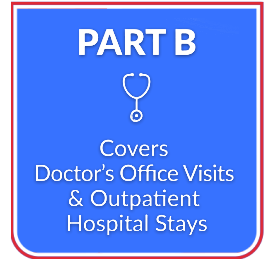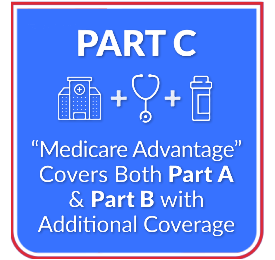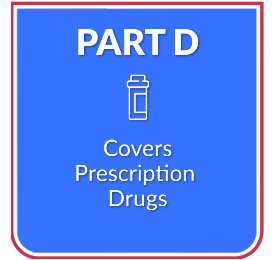Medicare Supplement Insurance also is known as “Medigap” fills in gaps Original Medicare and is offered by private companies.
Traditional Medicare plans pay for much, but not for all, and do not pay the costs for covered healthcare services and supplies. A Medicare Supplement Insurance (Medigap) policy/plan can help pay some remaining part of the healthcare costs, including:- Copayments
- Coinsurance
- Deductibles
Medicare Part A covers:
- Hospital care of inpatient
- Conditioned home health services
- Nursing facility care provided that custodial care isn’t the only care required
- Hospice care
- Critical access hospitals
- Acute care hospitals
- Long-term care hospitals
- Mental health care
- Inpatient rehabilitation facilities
- Participation in a clinical research study
Medicare Part A Costs
In Medicare Part A, you don’t pay a monthly premium for Hospital Insurance coverage if you and your spouse paid Medicare taxes while working. You will get a premium-free Part A at the age of 65 if:- You are receiving retirement benefits from social security
- You are receiving services from the railroad retirement board.
- You or your partner/spouse had government employment covering Medicare.
- You are a disabled person and got social security or railroad retirement board
- You have last stage Renal Disease
- The approximate cost is $458 each month.
- Days 1-60: $0 for each benefit period
- Days 61-90: $352 per day of each benefit period
- Days 91 and beyond: $704 per each “lifetime reserve day” after day 90 for each benefit period
Medicare Part A Enrollment
You will automatically get enrolled in Part A Medicare insurance if you turned 65 and receiving social security retirement benefits or railroad retirement board benefits. You will start receiving Medicare Part A benefits from the first day of the month you turned 65. If your birthday is on the first day of the month, your services will begin the month before you turn 65. The high time to get a Medicare plan is during your 6-month Medigap open enrollment period. You will get better prices and more policies.Medicare Part A Eligibility
You are eligible for a Medicare supplement insurance Part A if:- You are age 65 or older and a U.S. citizen.
- You are a legal resident of at least five years.
- You are getting retirement benefits.
- You are disabled and getting disability benefits.
- You have the last-stage renal disease (ESRD).
- You have amyotrophic lateral sclerosis.
Medicare Part A Premiums
Most Medicare part beneficiaries do not pay a premium if they worked at least ten years and paid Medicare taxes at that time. People who aren’t able to get premium-free Medicare Part A can also get themselves enroll in Part A and pay a premium. Four ways to pay your Premium:- Pay online via Medicare account.
- Pay directly from your Bank saving Account
- Medicare Easy Pay
- Mail check to Medicare
Medicare Part B consists of medical insurance that is part of Medicare and covers medical services and supplies. These are medically important in treating your health condition. Part B includes outpatient care, ambulance services, preventive services, and durable medical equipment. It also covers part-time home care and rehabilitative services, including physical therapy.
Medicare Part B covers:
- Medically necessary services: Services or supplies that are needed to diagnose or treat your medical condition and that meet accepted standards of medical practice.
- Preventive services: Health care to prevent illness (like the flu) or detect it at an early stage, when treatment is most likely to work best.
You pay nothing for most preventive services if you get the services from a health care provider who accepts assignment.
Part B Medicare services cover the following:
- Clinical research
- Limited outpatient prescription drugs
- Mental health
- Inpatient
- Outpatient
- Partial hospitalization
- Ambulance services
- Durable medical equipment (DME)
Part B Medicare insurance coverage is based on the following factors:
- Your state laws
- Federal laws
- National coverage decisions
- Local coverage decisions made by companies
Medicare Part B Costs
U.S. citizens can automatically get Medicare Part B insurance, and others need to sign up for Part B Medicare supplement. Every person who gets enrolled in Part B Medicare pays a premium each month. It also automatically deducted from their benefit payment each month if they get benefits from the following:
- Social security
- Railroad retirement board
- Personnel management office
And If you are not getting these benefits, you pay through a bill every month.
People usually pay a standard premium amount. If your gross income is above a certain amount, you also pay an income-related monthly amount. Medicare also uses a modified adjusted gross income reported for Part B MadIcare on their tax return from 2 years ago. This tax return information is the most recent tax return provided to social security administration by the IRS.
A standard Part B Medicare premium amount in 2024 is $174.70.
Medicare Part B Enrollment
If you’re receiving retirement benefits before the age of 65 or qualify Medicare insurance because of a disability at an early age you will automatically be enrolled in Medicare Part A and Part B as soon as you become eligible.
If you do not enroll during your initial enrollment period and also not qualify in the special enrollment period. In that case, you have the option to sign up during the annual enrollment period, which starts from 1st January to 31st March of each year and coverage starting from 1st July.
If you’re not automatically enrolled, you can also apply directly for Medicare supplement Insurance part B via the Social Security website either in person or by calling at 1-800-772-1213 on working days.
Remember, when you reach the age of 65 and have Medicare Part B, your six-month Medicare open enrollment period begins its time to purchase a Medicare Part B Supplemental plan. You’ll get a guaranteed-issue right to buy any Medicare plan without paying a higher premium or medical underwriting once you get enrolled in Medicare Part B, not to miss this initial guaranteed-issue enrollment period for Medigap supplement insurance.
Medicare Part B Eligibility
Anyone eligible for Medicare Part A is qualified for Medicare Part B by enrolling and paying a standard monthly premium. And if you are not able for Medicare Part A, you can also qualify for Medicare Part B by meeting the following criteria:
- You reached ta the age of 65 years or older.
- You are a U.S. citizen.
- You are a permanent resident residing in the U.S. for at last five continuous years.
You may also qualify for automatic Medicare Part B enrollment if you are a disabled person. Or if you are under 65 years of age and getting social security benefits, you will automatically get enrolled in Medicare Part B after 24 months of disability benefits. You will also get Medicare Part B insurance enrollment before 65 if you experience last-stage renal disease or amyotrophic lateral sclerosis.
Medicare Part B Premiums
Your Medicare Part B premiums can change from year to year, and cost can vary based on your situation. For many people, it is deducted automatically from their social security benefits.
The monthly Part B premium is $174.70 in 2024.
But if your income exceeds a certain amount, your premium may also increase than the standard premium, as there are different premiums for different income levels in Medicare part B.
If you don’t get social security or rail board benefits, you’ll get a bill to pay your premiums:
- Part B for medical insurance
- Part A for hospital insurance








